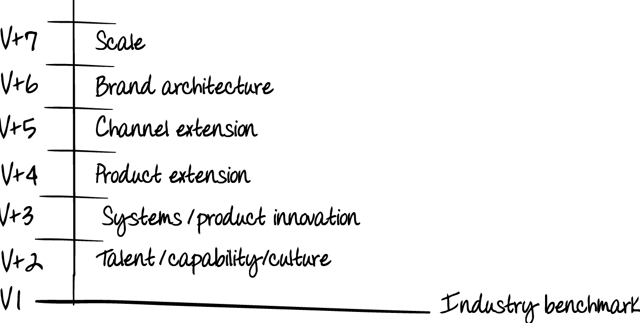When you first start a recruitment agency, you'll be focused on the smaller goals like getting through your first year. But as the successful years stack up, and you get used to taking the highs and the lows in your stride, you'll be able to focus on your end goal. At this point, you'll wonder: 'How valuable is my recruitment agency?' Here's how you find that answer.
In this blog, we'll focus on Shirlaw's business valuation chart. They've outlined Seven Layers of Valuation for a business. I wanted to explore how we could apply these things to a recruitment agency.

The main thing to note is that one is the least valuable and seven is the most valuable.
1. Industry Benchmark
This is the most obvious way to judge the value of a business. The typical way that a business can work out its financial worth is by using the multiplier EBITDA (Earnings Before Interest, Taxes, Depreciation, and Amortization). Simply put, this formula shows the earning potential of a business. The EBITDA format provides a simple multiplier on how profitable your business is. This is where you begin in terms of determining your agency's value.
2. Talent/Capability/Culture
Then you need to consider the other assets that contribute to your business' value. This includes things like the talent you employ. To determine your employees' worth, the best way to approach this is by thinking about their capability and potential. Consider your business' culture too. A good business culture allows you to attract and retain talent and a magnetic employer brand makes your business attractive to candidates, adding to your overall value.
3. Systems/Product Innovation
The other thing to think about are the processes within your business. Are they effective? Efficient? The way that a business runs is another key indicator of how valuable it is as it shows how easily the business could scale. Product innovation refers to how easily you could update your services and how competitive they are within the market place.
4. Product Extension
 Product extension refers to how easily you can make more from what you already do. So, if you're working within contingent recruitment, could you easily move into retained recruitment? Would that transition add more value to your business? The ease you can move into a new business model is another way to determine its value. It shows you can find new revenue sources. Anything you can add to your current business model provides access to new resources, in turn creating more value for your business.
Product extension refers to how easily you can make more from what you already do. So, if you're working within contingent recruitment, could you easily move into retained recruitment? Would that transition add more value to your business? The ease you can move into a new business model is another way to determine its value. It shows you can find new revenue sources. Anything you can add to your current business model provides access to new resources, in turn creating more value for your business.
5. Channel Extension
Like product extension, channel extension is a metric based on ways you could grow your business. It's judged in terms of how easily its products are found and sold. Product extension includes things like referrals and partner programs, online and offline growth opportunities, and how mature your service is. Joining networking groups like TEAM provides great scope for getting your business' name out there and into more conversations. It leads to increased brand exposure and due to the referrals this sort of partnership generates, your conversion rate should increase too. The channel extension part of the valuation process is all about determining how easy it is for people to find your product and services, and how effective your process is to get your product to market.
6. Brand Architecture
In the Shirlaws' chart, your business brand ranks highly in terms of value. The best way to judge its effectiveness is by considering how easily understood your message is. Does it connect with the right audience? Can it be easily articulated by employees and audience members alike?
Your business' identity is an important part of the overall package that customers buy into. Your brand is what makes you unique or different, and it's how you differentiate yourself from your competitors. So, consider how easy it is to define what you do and what makes you different.
7. Scalable
Determining how scalable your business is sits at the top of the Shirlaws' valuation chart. The best way to judge this metric is by considering how easy it would be for your business to open a new office. Could you replicate your business in another city? Would this new office be completely self-sufficient? Part of this is based on how effective your internal processes are. Part of it is dependant on if your business can run without your input. Some questions to consider here are: are there any opportunities for you to make more money? Could you move into another sector, perhaps from IT into accounts?
What's Your Worth?
One of the things to remember is that your business is only worth as much as someone is willing to pay for it. Much of its value is based on how well you can package up the intangible worth of your business. Part of this is down to your brand; part of this is down to you. So, consider your business as objectively as possible. What makes it more valuable than simply its monetary worth?
Wendy McDougall
Wendy McDougall is Chief Fish of Firefish Software. In her spare time, you'll find her playing squash or feeding her inner geek with the latest technology!




